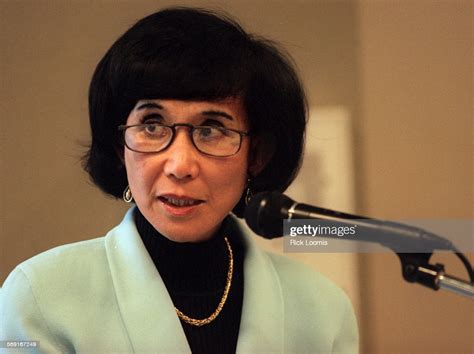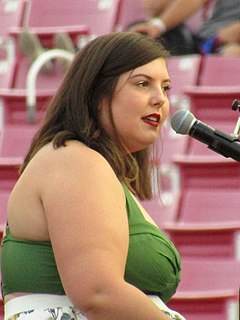A Quote by Marquis de Sade
She had already allowed her delectable lover to pluck that flower which, so different from the rose to which it is nevertheless sometimes compared, has not the same faculty of being reborn each spring.
Related Quotes
Back and forth she went each morning by the river, spring arriving once again; foolish, foolish spring, breaking open its tiny buds, and what she couldn’t stand was how—for many years, really—she had been made happy by such a thing. She had not thought she would ever become immune to the beauty of the physical world, but there you were. The river sparkled with the sun that rose, enough that she needed her sunglasses.
She was made up of more, too. She was the books she read in the library. She was the flower in the brown bowl. Part of her life was made from the tree growing rankly in the yard. She was the bitter quarrels she had with her brother whom she loved dearly. She was Katie's secret, despairing weeping. She was the shame of her father stumbling home drunk. She was all of these things and of something more...It was what God or whatever is His equivalent puts into each soul that is given life - the one different thing such as that which makes no two fingerprints on the face of the earth alike.
She was bedridden falling a fall which broke her hip. X-rays showed that she had cancer of the colon which had already spreed. To my surprise I found her cheerful and free of pain, perhaps because of the small doses of morphine she was being given. She was surrounded by neighbours and friends who congregated at her bedside day and night. In this cosy, noisy, gregarious world of the "all-chinese" sickbed, so different from the stark, sterile solitude of the American hospital room, her life had assumed the astounding quality of a continuous farewell party.
I think Eleanor Roosevelt always had a most incredible comfort writing letters. I mean, she was in the habit of writing letters. And that's where she allowed her fantasies to flourish. That's where she allowed her emotions to really evolve. And that's where she allowed herself to express herself really fully, and sometimes whimsically, very often romantically. And it really starts with her letters to her father, who is lifelong her primary love.
The wide world was changing, and she wanted a different place in it. Not just wanted, but felt she deserved. If the world didn't owe her a living, as her mother repeatedly warned her, it owed her a break. She had a strong sense that a better, more exciting, more rewarding life than that which had been the lot of her parents and grandparents was hers by right. In this she was guilty of nothing more serious than the arrogance of youth, from which every generation suffers and by which it distinguishes itself from the preceding one.
Director Park always talked to me about her in a very innocent way, that the story was of her coming of age and her sexual awakening and her going from girl to woman and that she had the same desires and hopes as other young people in terms of being very infatuated, which comes in the form of her uncle, which is very unconventional.
She was still under the spell of her infatuation. She had tried to forget him, realizing the inutility of remembering. But the thought of him was like an obsession, ever pressing itself upon her. It was not that she dwelt upon details of their acquaintance, or recalled in any special or peculiar way his personality; it was his being, his existence, which dominated her thought, fading sometimes as if it would melt into the mist of the forgotten, reviving again with an intensity which filled her with an incomprehensible longing.
In the end it is nothing other than the loving kindness with which the woman cares for her child that makes the difference. Her concern concentrates on one thing just like the Buddhist practice of concentration. She thinks of nothing but her child, which is similar to Buddhist compassion. That must be why, although she created no other causes to bring about it, she was reborn in the Brahma heaven.
The universal nature has no external space; but the wondrous part of her art is that though she has circumscribed herself, everything which is within her which appears to decay and to grow old and to be useless she changes into herself, and again makes other new things from these very same, so that she requires neither substance from without nor wants a place into which she may cast that which decays. She is content then with her own space, and her own matter, and her own art.
…there would be no powerful will binding hers in that blind persistence with which men and women believe they have a right to impose a private will upon a fellow creature…And yet she had loved him- sometimes. Often she had not. What did it matter! What could love, the unsolved mystery, count for in the face of this possession of self-assertion which she suddenly recognized as the strongest impulse of her being.
Flower god, god of the spring, beautiful, bountiful,
Cold-dyed shield in the sky, lover of versicles,
Here I wander in April
Cold, grey-headed; and still to my
Heart, Spring comes with a bound, Spring the deliverer,
Spring, song-leader in woods, chorally resonant;
Spring, flower-planter in meadows,
Child-conductor in willowy
Fields deep dotted with bloom, daisies and crocuses:
Here that child from his heart drinks of eternity:
O child, happy are children!
Lara walked along the tracks following a path worn by pilgrims and then turned into the fields. Here she stopped and, closing her eyes, took a deep breath of the flower-scented air of the broad expanse around her. It was dearer to her than her kin, better than a lover, wiser than a book. For a moment she rediscovered the purpose of her life. She was here on earth to grasp the meaning of its wild enchantment and to call each thing by its right name, or, if this were not within her power, to give birth out of love for life to successors who would do it in her place.





































